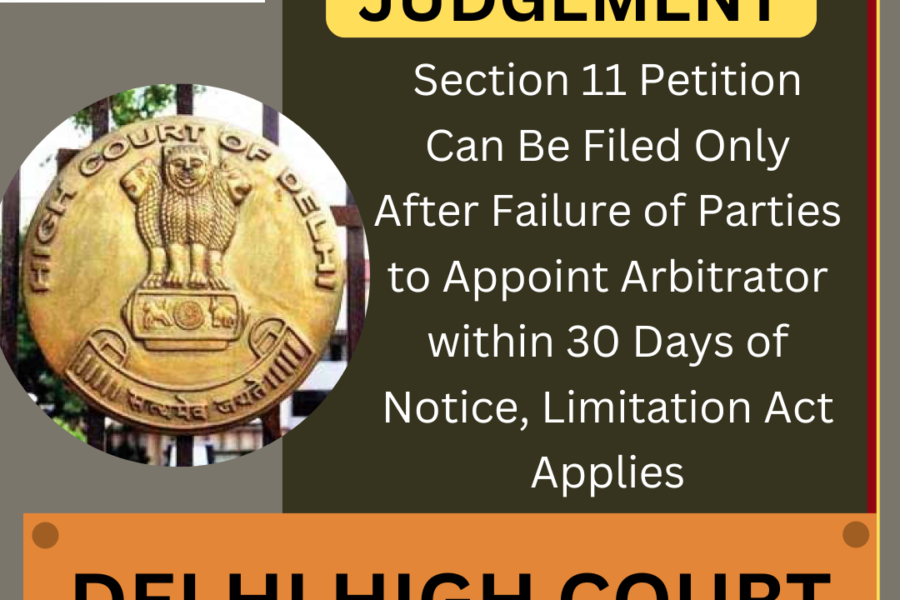Delhi High Court
The recent judgment by the Delhi High Court regarding the filing of Section 11 petitions under the Arbitration and Conciliation Act, 1996, has significant implications for arbitration proceedings in India. The court’s ruling clarifies the procedural requirements for invoking the court’s jurisdiction to appoint an arbitrator and underscores the applicability of the Limitation Act, 1963, in such matters. This article provides a comprehensive analysis of the judgment, its rationale, and its implications for arbitration law in India.
Background:
The case before the Delhi High Court involved a dispute arising from an arbitration agreement between two parties. The agreement provided that in the event of a dispute, either party could issue a notice to the other party requesting the appointment of an arbitrator. However, if the parties failed to appoint an arbitrator within 30 days of receiving the notice, either party could approach the court for the appointment of an arbitrator under Section 11 of the Arbitration and Conciliation Act, 1996.
Legal Principles:
Section 11 of the Arbitration and Conciliation Act, 1996, empowers the court to appoint an arbitrator in certain circumstances, including when the parties fail to agree on the appointment of an arbitrator. However, the procedural requirements for invoking the court’s jurisdiction under Section 11, including the timing of filing the petition and the applicability of the Limitation Act, have been the subject of judicial interpretation and debate.
Analysis of the Judgment:
In its judgment, the Delhi High Court clarified the procedural requirements for filing Section 11 petitions and the applicability of the Limitation Act in such matters. The court held that a Section 11 petition can be filed only after the failure of the parties to appoint an arbitrator within 30 days of receiving the notice under the arbitration agreement. Furthermore, the court ruled that the Limitation Act applies to Section 11 petitions and any delay in filing the petition beyond the prescribed limitation period would render it time-barred.
The court reasoned that the purpose of providing a 30-day period for the parties to appoint an arbitrator is to facilitate the expeditious resolution of disputes through arbitration. By imposing a time limit on the parties’ ability to appoint an arbitrator, the arbitration agreement seeks to prevent undue delays in the arbitration process and ensure timely resolution of disputes. Therefore, a Section 11 petition can only be filed after the expiry of the 30-day period, provided that the parties have failed to appoint an arbitrator within that timeframe.
Moreover, the court emphasized that the Limitation Act applies to Section 11 petitions, as they are akin to civil suits and are subject to the same procedural requirements. Any delay in filing the Section 11 petition beyond the prescribed limitation period would render it time-barred, and the court would be precluded from entertaining the petition. This underscores the importance of diligence and timeliness in initiating Section 11 proceedings to avoid the risk of the petition being dismissed on the grounds of limitation.
Implications for Arbitration Law:
The judgment by the Delhi High Court has significant implications for arbitration law in India. By clarifying the procedural requirements for filing Section 11 petitions and affirming the applicability of the Limitation Act, the court has provided clarity and guidance to parties engaged in arbitration proceedings. The ruling underscores the importance of adherence to procedural timelines and the need for expeditious resolution of disputes through arbitration.
Furthermore, the judgment highlights the significance of arbitration agreements in facilitating the resolution of disputes outside the traditional court system. By empowering parties to appoint arbitrators and providing a mechanism for the court’s intervention in case of failure to appoint an arbitrator, arbitration agreements promote autonomy and efficiency in dispute resolution.
Conclusion:
The recent judgment by the Delhi High Court regarding the filing of Section 11 petitions under the Arbitration and Conciliation Act, 1996, represents a significant development in arbitration law in India. By clarifying the procedural requirements for invoking the court’s jurisdiction to appoint an arbitrator and affirming the applicability of the Limitation Act, the court has provided much-needed guidance to parties engaged in arbitration proceedings.
Moving forward, parties and legal practitioners must heed the court’s guidance and ensure compliance with the procedural requirements for filing Section 11 petitions. By promoting efficiency and expeditious resolution of disputes through arbitration, the judgment reinforces the significance of arbitration as a preferred method of dispute resolution in India.
Adv. Khanak Sharma

